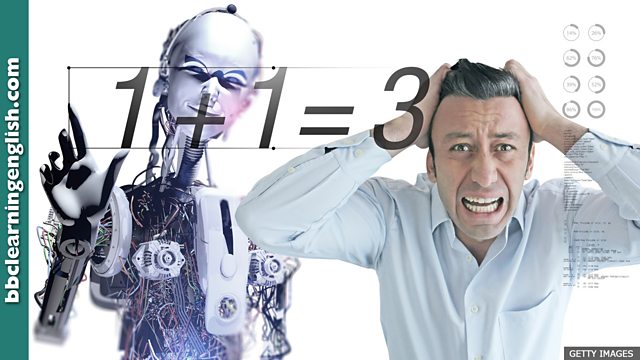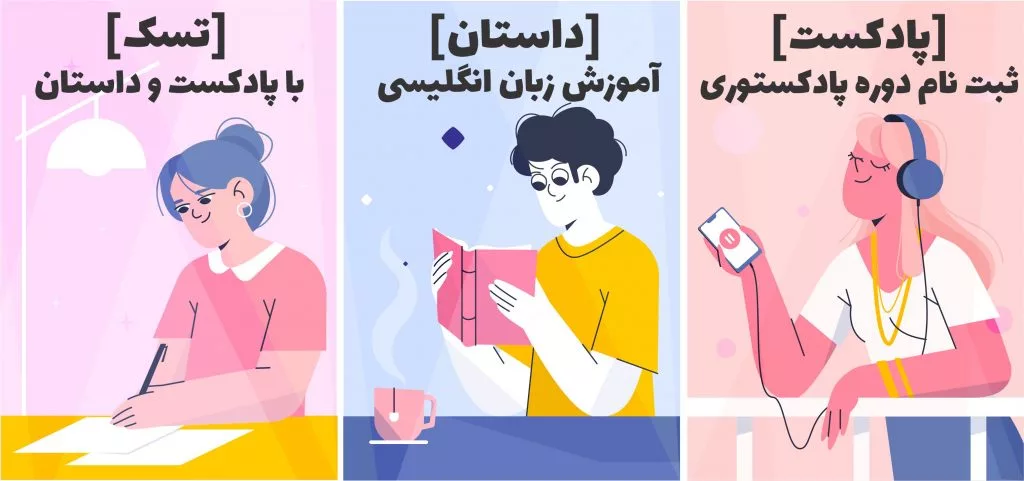پادکست انگلیسی BBC – فناوری
در پادکست انگلیسی BBC – فناوری درباره فناوری و اینکه همیشه راه حل خوبی هست یا نه صحبت میشه. انسانها ناقص هستند و تعصبات وعقاید خود را با خود حمل می کنند. آیا می توانیم از کامپیوترهایی استفاده کنیم که به جای ما فکر کنند، اگر بتوانیم آنها را با هوش مصنوعی جایگزین کنیم ، بهتر نیست؟ آیا فناوری راه حل خوبی برای همه مشکلات ما است؟
سوال پادکست انگلیسی BBC – فناوری :
Artificial Intelligence, or A.I., is an area of computer science that develops the ability of computers to learn to do things like solve problems or drive cars without crashing. But in what decade was the term ‘Artificial Intelligence’ coined? Was it:
a) 1940s
b) 1950s
c) 1960s
به پادکست خوب گوش کن تا جواب رو پیدا کنی.
اگر می خوای گوش دادن به پادکست تا حد امکان برات ساده و کارآمد باشه مراحل زیر را دنبال کن:
هر روز به پادکست گوش کن. وقتی براش یه وقت ثابت در روز در نظر بگیری برات تبدیل به عادت میشه و این عادت هرروز پیشرفت میکنه.
پادکستی رو پیدا کن که موضوعش برات جالب باشه. وقتی از خود موضوع لذت ببری یادگیری هم برات لذتبخش میشه.
به پادکستی گوش کن که transcript یا متن داره. این بهت کمک می کنه تا کلمات و عبارات جدید رو به سرعت در متن پیدا کنی و ساختار انواع مختلف جمله رو خوب یاد بگیری.
پس از گوش دادن به پادکست با متن، در مرحله بعدی سعی کن بدون نگاه کردن به متن این کار رو انجام بدی. این کار مهارت شنیداری رو تقویت می کنه و کمک می کنه تا انگلیسی زبانان بومی را راحت تر درک کنی، حتی اگر خیلی سریع صحبت کنن.
اگه به پادکست انگلیسی گوش کردی و نتونستی کامل متوجه اش بشی، ناامید نشو. پادکست هایESL -English as Second Language بیشماری وجود دارن که برای سطوح مختلف، از ابتدایی تا پیشرفته طراحی شدن. مطمئنا هر روز می تونین یه پادکست مناسب با سطح خودت پیدا کنی.
فراموش نکن که هرچی بیشتر تمرین کنی در اون مهارت رشد میکنی! به قول انگلیسی ها: Practice makes perfect
واژگان کلیدی پادکست انگلیسی BBC - فناوری
| معنی به فارسی | معنی به انگلیسی | واژه |
| میهن پرست متعصب | someone who believes their country, race or sex is better than any others | chauvinist |
| عقیدهای که میگوید همیشه فناوری راه حل بهتری است | the belief that a technological solution is always a better solution to a problem | technochauvinism |
| بی طرفريال منصفانه و متعادل | neutral, fair and balanced | objective |
| یک نرم افزار و شاید کسی که کاری را برای شما انجام می دهد، از طرف شما | a piece of software but also someone who does something for you, on your behalf | proxy |
| یک مشکل ظریف | a problem which has small and important areas which may be hard to spot, but they need to be considered | a nuanced problem |
| مجموعه ای از دستورالعمل های نرم افزار برای یک سیستم رایانه ای | a set of software instructions for a computer system | an algorithm |
BBC 6 minute English -Is technology always the solution?

برای دانلود پادکست روی سه نقطه سمت راست کلیک و گزینه Download را انتخاب کنید.
متن پادکست انگلیسی BBC - فناوری
Catherine
Hello and welcome to 6 Minute English. I'm Catherine.
Rob
And hello, I'm Rob.
Catherine
Today we have another technology topic.
Rob
Oh good! I love technology. It makes things easier, it’s fast and means I can have gadgets.
Catherine
Do you think that technology can actually do things better than humans?
Rob
For some things, yes. I think cars that drive themselves will be safer than humans but that will take away some of the pleasure of driving. So I guess it depends on what you mean by better.
Catherine
Good point, Rob. And that actually ties in very closely with today’s topic which is technochauvinism.
Rob
What’s that?
Catherine
We’ll find out shortly, Rob, but before we do, today’s quiz question. Artificial Intelligence, or A.I., is an area of computer science that develops the ability of computers to learn to do things like solve problems or drive cars without crashing. But in what decade was the term 'Artificial Intelligence' coined? Was it:
a) the 1940s,
b) the 1950s or
c) the 1960s?
Rob
I think it's quite a new expression so I'll go for c) the 1960s.
Catherine
Good luck with that, Rob, and we’ll give you the answer later in the programme. Now, let's get back to our topic of technochauvinism.
Rob
I know what a chauvinist is. It’s someone who thinks that their country or race or sex is better than others. But how does this relate to technology?
Catherine
We’re about to find out. Meredith Broussard is Professor of Journalism at New York University and she’s written a book called Artificial Unintelligence. She appeared on the BBC Radio 4 programme More or Less to talk about it. Listen carefully and find out her definition of technochauvinism.
Meredith Broussard, Professor of Journalism at New York University
Technochauvinism is the idea that technology is always the highest and best solution. So somehow over the past couple of decades we got into the habit of thinking that doing something with a computer is always the best and most objective way to do something and that’s simply not true. Computers are not objective, they are proxies for the people who make them.
Catherine
What is Meredith Broussard's definition of technochauvinism?
Rob
It's this idea that using technology is better than not using technology.
Catherine
She says that we have this idea that a computer is objective. Something that is objective is neutral, it doesn’t have an opinion, it’s fair and it's unbiased – so it’s the opposite of being a chauvinist. But Meredith Broussard says this is not true.
Rob
She argues that computers are not objective. They are proxies for the people that make them. You might know the word proxy when you are using your computer in one country and want to look at something that is only available in a different country. You can use a piece of software called a proxy to do that.
Catherine
But a proxy is also a person or a thing that carries out your wishes and your instructions for you. So computers are only as smart or as objective as the people that programme them. Computers are proxies for their programmers. Broussard says that believing too much in Artificial Intelligence can make the world worse. Let’s hear a bit more. This time find out what serious problems in society does she think may be reflected in AI?
Meredith Broussard, Professor of Journalism at New York University
It’s a nuanced problem. What we have is data on the world as it is and we have serious problems with racism, sexism, classism, ageism, in the world right now so there is no such thing as perfect data. We also have a problem inside the tech world where the creators of algorithms do not have sufficient awareness of social issues such that they can make good technology that gets us closer to a world as it should be.
Rob
She said that society has problems with racism, sexism, classism and ageism.
Catherine
And she says it’s a nuanced problem. A nuanced problem is not simple, but it does have small and important areas which may be hard to spot, but they need to be considered.
Rob
And she also talked about algorithms used to program these technological systems. An algorithm is a set of instructions that computers use to perform their tasks. Essentially it’s the rules that they use to come up with their answers and Broussard believes that technology will reflect the views of those who create the algorithms.
Catherine
Next time you're using a piece of software or your favourite app you might find yourself wondering if it's a useful tool or does it contain these little nuances that reflect the views of the developer.
Rob
Right, Catherine. How about the answer to this week's question then?
Catherine
I asked in which decade was the term 'Artificial Intelligence' coined. Was it the 40s, the 50s or the 60s?
Rob
And I said the 60s.
Catherine
But it was actually the 1950s. Never mind, Rob. Let’s review today’s vocabulary.
Rob
Well, we had a chauvinist – that's someone who believes their country, race or sex is better than any others.
Catherine
And this gives us technochauvinism, the belief that a technological solution is always a better solution to a problem.
Rob
Next - someone or something that is objective is neutral, fair and balanced.
Catherine
A proxy is a piece of software but also someone who does something for you, on your behalf. A nuanced problem is a subtle one, it’s not a simple case of right or wrong, in a nuanced problem there are small but important things that you need to consider.
Rob
And an algorithm is a set of software instructions for a computer system.
Catherine
Well, that’s all we have time for today. Goodbye for now.
Rob
Bye bye!
امیدوارم از پادکست انگلیسی BBC - فناوری لذت برده باشید.
گوش دادن به پادکست روش خوبی برای تقویت مهارت شنیداری و هم چنین یادگرفتن کلمات در بستر یک موضوع خاصه که این به تقویت مهارت مکالمه انگلیسی نیز کمک زیادی می کنه.
اگه تو هم از اون آدمهایی هستی که از گوش دادن به پادکست لذت می بره برات یه خبر خوب دارم! آموزشگاه زبان انگلیسی 24talk یه دوره طراحی کرده مبتنی بر پادکست و داستان کوتاه به اسم "پادکستوری - Podcastory". این دوره سعی کرده یادگیری زبان انگلیسی رو مناسب با نیاز و سطح زبان آموز به یه فرایند بسیار مفرح، موثر، سریع و کم هزینه تبدیل کنه.
همین الان می تونی با کلیک روی عکس زیر و ثبت نام در دوره ی آموزش زبان انگلیسی با پادکست و داستان ۲۴talk اولین و مهم ترین قدم رو برای یادگیری زبان انگلیسی برداری. وقت رو از دست نده!
دوره پادکستوری آکادمی مجازی 24talk
برای شنیدن دیگر پادکست ها، به بخش پادکست در مرکز آموزش رایگان مراجعه نمایید.








